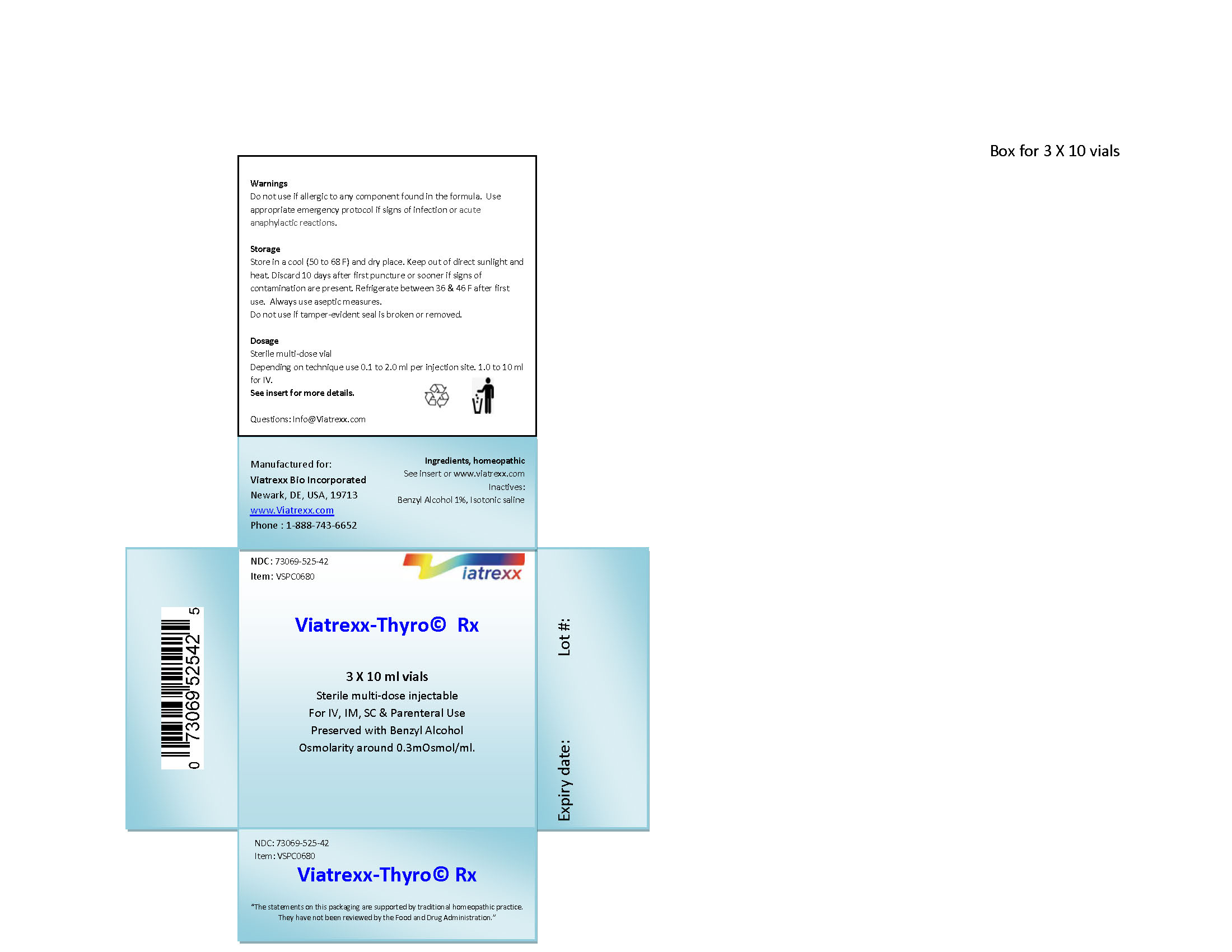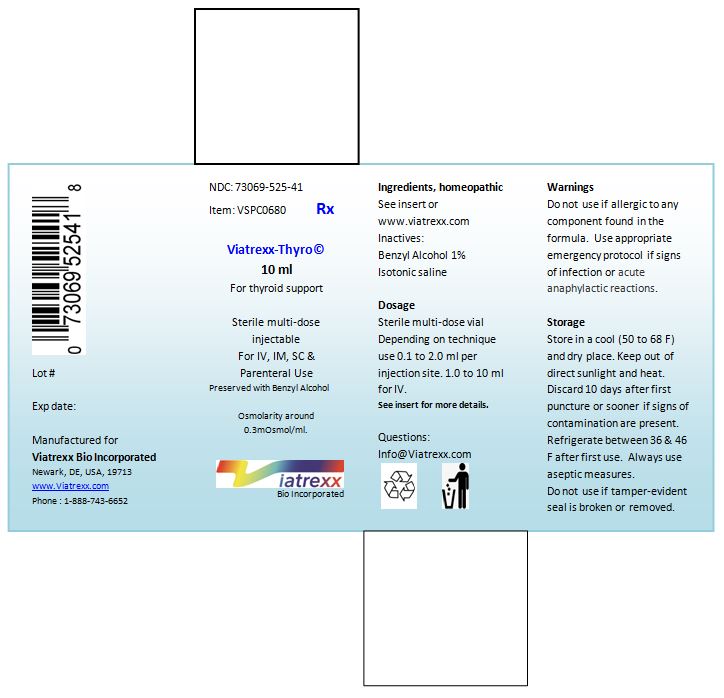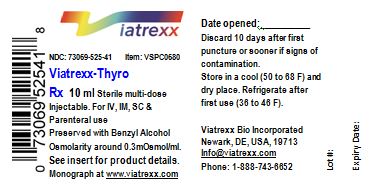Viatrexx-thyro while Breastfeeding

What is Viatrexx-thyro used for?
Is Viatrexx-thyro usage safe while breastfeeding? If a lactating mother is using it can there be any effect on growth or development of infant?
Nursing Mothers It is not known whether the benzyl alcohol or any of the ingredients is excreted in human milk. Caution should be exercised when products with benzyl alcohol are administered to nursing woman.
Viatrexx-thyro Breastfeeding Analsys
Iodine while Breastfeeding
UnsafeCAS Number: 7553-56-2
Disinfectant that contains high amount (2-7%) of Iodine in solution with alcohol or water (Lugol's solution) Not absorbed through intact skin of adults. However, it may trespass the inflamed skin, wounds, mucosa surfaces like vagina, in which case can reach concentration in grams in the human serum (1 g = 1,000 milligrams = 1,000,000 micrograms). Normal daily allowance is considered to be as high as 100 to 150 micrograms that increases to 200 – 300 micrograms in pregnancy or nursing period. The latter means less than one third of a milligram. Iodine is concentrated into breast milk with a level that could reach 20 times higher than the concentration in the blood. It has been found higher levels of Iodine, altered results of neonatal screening test for thyroid function, and, transient hypothyroidism in infants whose mothers were exposed to Iodine Povidone. Use should be avoid in the Delivery Room, Operating Room (C-section), Neonatal Units, Toddler admision areas and during the breastfeeding period. Sporadic or inadvertent use, specially on normal skin, does not require special test or procedures because it does not pose higher risk to the child.
Levothyroxine while Breastfeeding
SafeCAS Number: 51-48-9

It should be taken into account whenever screening test are done in neonates. No problems have been reported when the usual therapeutic substitutive dosage is used to keep the mother euthyroid. Follow-up thyroid function cautiously in the infant when a higher suppressive dosage is used. Under latter conditions, a lack of ejection reflex despite an appropriate milk production has been observed in animals. American Academy of Pediatrics: Maternal Medication Usually Compatible With Breastfeeding.
Liothyronine while Breastfeeding
SafeCAS Number: 55-06-1
Synthetic preparation of human thyroid hormone T3 used in the treatment of hypothyroidism. Since the last update, we have not found published data on its excretion in breast milk. T3 is a natural component of breast milk, found in small concentrations that may or may not depend on plasma levels (Zhang 2013, Oberkotter 1989, Jansson 1983, Mizuta 1983, Sato 1979). Its concentration in breast milk is much higher than that of levothyroxine (T4), which is usually undetectable (Jansson 1983, Sato 1979). Until there is more published data on this drug in relation to breastfeeding, safer known alternatives (levothyroxine) may be preferable, especially during the neonatal period and in case of prematurity. Associations which are experts in thyroid diseases recommend treatment with levothyroxine in breastfeeding mothers affected by hypothyroidism (Alexander 2017).
Fucus vesiculosus while Breastfeeding
Unsafe
Seaweed. The stem of the plant is used.It contains large amounts of mucilage and minerals, including iodine which appears in variable amounts that can be significant, in such a way that it may be a cause a hyperthyroidism-like disease (anxiety, insomnia, tachycardia, palpitations).It may also contain heavy metals, being a species of seaweed with a high ability of contamination by toxic products. The commission E of the German Health Ministry has not approved any clinical indication, discouraging its use. At latest update no published data on excretion into breast milk were found. However, there is information from other algae whose consumption is known to increase iodine levels in the plasma and breast milk.There have been reports of hypothyroidism in infants whose mothers have included in their diet important quantities of seaweed. There is no evidence of effectiveness on increasing milk production. The most effective method to increase milk production should be done by strengthening maternal self-confidence, evaluate and correct problems along with an effective support to breastfeeding mothers.
Viatrexx-thyro Breastfeeding Analsys - 2
Iodine while Breastfeeding
CAS Number: 7553-56-2
Iodine is an essential trace nutrient for all infants that a normal component of breastmilk. Infant requirements are estimated to be 15 mcg/kg daily in fullterm infants and 30 mcg/kg daily in premature infants.[1] Systematic reviews and studies on iodine nutrition found that iodine in breastmilk is adequate in iodine-sufficient countries, but in countries with iodine fortification of foods, many mothers did not obtain adequate iodine and that additional supplementation was desirable.[2][3][4][5] In iodine-deficient areas, supplementation of breastfeeding mothers with iodine appears to be more effective than direct supplementation of the infant in reducing infant iodine deficiency.[6] The American Thyroid Association recommends that breastfeeding women should supplement their diet with a daily oral supplement that contains 150 mcg of iodine, but sustained iodine intake while breastfeeding that exceeds 500 to 1100 mcg daily should be avoided.[7] A survey in the United States between 2011 and 2014 found that only 19% of lactating women used a dietary supplement that contained iodine.[8] The use of excessive amounts of iodine in the mother near term and during breastfeeding (e.g., seaweed soup) can increase breastmilk iodine levels and cause transient hypothyroidism in breastfed infants. The absorption of iodine can be marked after application to open wounds or mucous membranes. Exposure of mothers to unnecessary iodine who are or will be breastfeeding should be avoided or minimized to the extent possible by avoiding its use on maternal mucous membranes (e.g., vaginal use, wound therapy), avoiding prolonged contact time, avoiding repeated applications, and applying it to the smallest possible surface areas of the body. It is possible that maternal exposure to iodine near term could interfere with thyroid studies done as a part of newborn screening tests.
Thyroid, bovine while Breastfeeding
CAS Number: 8028-36-2
Thyroid is an animal-derived mixture of levothyroxine (T4) and liothyronine (T3), which are normal components of human milk. Limited data on exogenous replacement doses of levothyroxine during breastfeeding indicate no adverse effects in infants. If thyroid is required by the mother, it is not a reason to discontinue breastfeeding. The American Thyroid Association recommends that subclinical and overt hypothyroidism should be treated with levothyroxine in lactating women seeking to breastfeed.[1] Thyroid dosage requirement may be increased in the postpartum period compared to prepregnancy requirements patients with Hashimoto's thyroiditis.[2]
Thyroid, porcine while Breastfeeding
CAS Number: 8028-36-2
Thyroid is an animal-derived mixture of levothyroxine (T4) and liothyronine (T3), which are normal components of human milk. Limited data on exogenous replacement doses of levothyroxine during breastfeeding indicate no adverse effects in infants. If thyroid is required by the mother, it is not a reason to discontinue breastfeeding. The American Thyroid Association recommends that subclinical and overt hypothyroidism should be treated with levothyroxine in lactating women seeking to breastfeed.[1] Thyroid dosage requirement may be increased in the postpartum period compared to prepregnancy requirements patients with Hashimoto's thyroiditis.[2]
Levothyroxine while Breastfeeding
CAS Number: 51-48-9
Levothyroxine (T4) is a normal component of human milk. Limited data on exogenous replacement doses of levothyroxine during breastfeeding indicate no adverse effects in infants. The American Thyroid Association recommends that subclinical and overt hypothyroidism should be treated with levothyroxine in lactating women seeking to breastfeed.[1] Levothyroxine dosage requirement may be increased in the postpartum period compared to prepregnancy requirements patients with Hashimoto's thyroiditis.[2]
Liothyronine while Breastfeeding
CAS Number: 6893-02-3
Liothyronine (T3) is a normal component of human milk. If replacement doses of liothyronine are required by the mother, it is not necessarily a reason to discontinue breastfeeding. However, because no information is available on the use of exogenous liothyronine during breastfeeding, an alternate drug may be preferred. The American Thyroid Association recommends that subclinical and overt hypothyroidism should be treated with levothyroxine in lactating women seeking to breastfeed.[1] Liothyronine dosage requirement may be increased in the postpartum period compared to prepregnancy requirements patients with Hashimoto's thyroiditis.[2]
Viatrexx-thyro Breastfeeding Analsys - 3
Thyroid, bovine and Breastfeeding
SafeThyroid, porcine and Breastfeeding
SafeI am nursing mother and I have already used Viatrexx-thyro, what should I do?
Not much study has been done on safety of Viatrexx-thyro in breastfeeding and its ingredients. Even we do not have complete information about usage of Viatrexx-thyro in breastfeeding so at this point a trained medical professional could be your best bet. If you observe anything abnormal with your baby please contact 911.
I am nursing mother and my doctor has suggested me to use Viatrexx-thyro, is it safe?
If your doctor considers Viatrexx-thyro safe enough to prescribe for you that means its benefits should outweigh its known risks for you.
If I am using Viatrexx-thyro, will my baby need extra monitoring?
We are not Sure, Please check with your healthcare provider or doctor.
Who can I talk to if I have questions about usage of Viatrexx-thyro in breastfeeding?
US
National Womens Health and Breastfeeding Helpline: 800-994-9662 (TDD 888-220-5446) 9 a.m. and 6 p.m. ET, Monday through Friday
UK
National Breastfeeding Helpline: 0300-100-0212 9.30am to 9.30pm, daily
Association of Breastfeeding Mothers: 0300-330-5453
La Leche League: 0345-120-2918
The Breastfeeding Network supporter line in Bengali and Sylheti: 0300-456-2421
National Childbirth Trust (NCT): 0300-330-0700
Australia
National Breastfeeding Helpline: 1800-686-268 24 hours a day, 7 days a week
Canada
Telehealth Ontario for breastfeeding: 1-866-797-0000 24 hours a day, 7 days a week
